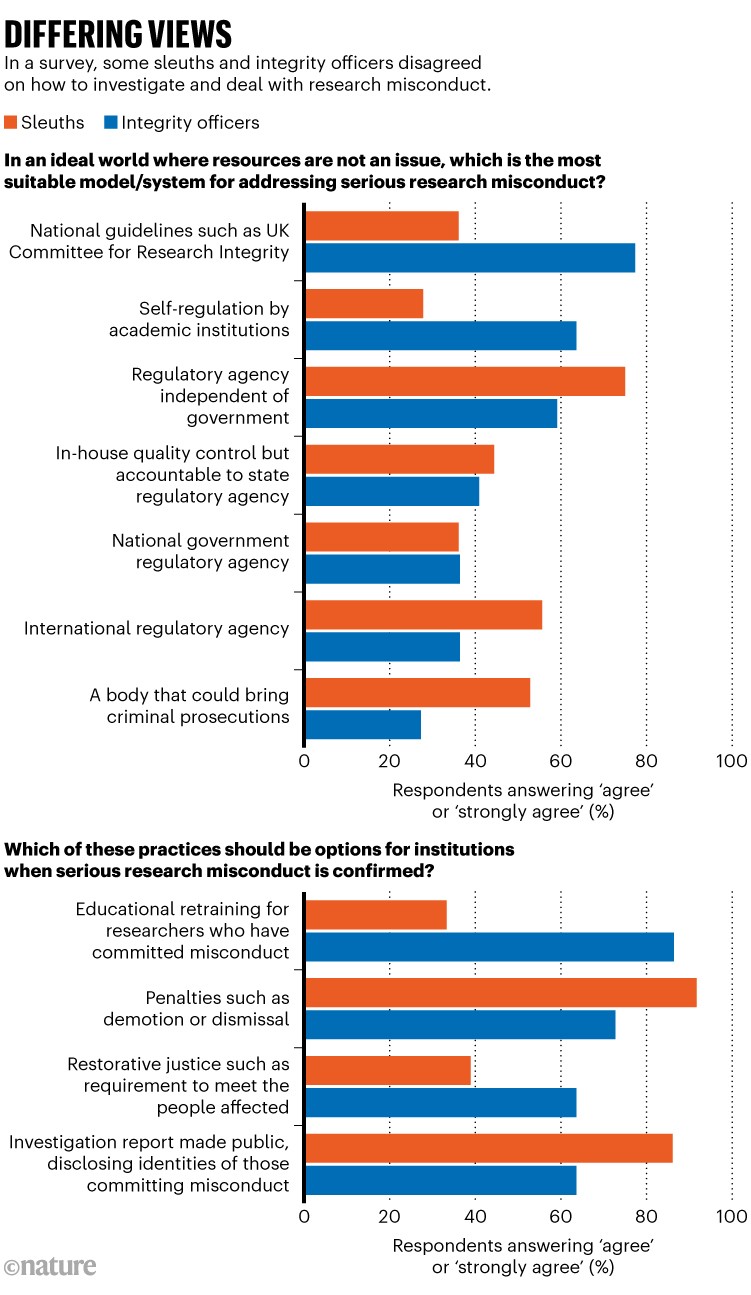
People who seek out incidences of misconduct don’t necessarily agree with those tasked with dealing out consequences.Credit: A. Martin UW Photography/Getty
A survey of scientific sleuths and integrity officers at research institutions shows that the two groups disagree about how to deal with serious cases of research misconduct, such as data fabrication, image manipulation and plagiarism.

The science institutions hiring integrity inspectors to vet their papers
The results, reported in a preprint posted on Zenodo last month1, reflect ongoing tensions between sleuths, who detect and report potential breaches of research integrity in the scientific literature — often anonymously, on public forums such as PubPeer — and integrity officers, who are responsible for investigating and responding to allegations of misconduct at their institutions. The two groups had differing views on whether universities can investigate their own researchers fairly, and what action should be taken when misconduct is found.
“We lack a system for dealing with reports of individuals or groups who have committed research misconduct, which is really badly handled at the moment and handled typically in a very ad hoc fashion,” says Dorothy Bishop, an integrity sleuth and retired psychologist at the University of Oxford, UK, who ran the survey.
She hopes that the findings will kick-start a dialogue between sleuths and research-integrity officers that will help to establish “recommendations for what the optimal system for handling research fraud is”.
Battling misconduct
The survey included responses from 79 participants, including 36 sleuths, 22 institutional research-integrity officers and 21 researchers and journal editors.The majority of them were from Europe. In her preprint, Bishop said there was broad agreement between sleuths and research-integrity officers that the pressure to publish can encourage dubious practices, and that institutions must take action when serious misconduct is found.
However, there were also stark disagreements. A little less than 6% of sleuths agreed that current reporting channels for misconduct are effective, compared to 77% of research-integrity officers. In free comments, some sleuth respondents said they thought institutional investigations into potential misconduct are too slow, or are hindered by conflicts of interest.

Source: Ref. 1
Around 64% of research-integrity officers said that the best way to deal with misconduct allegations is a self-regulation model, in which institutions investigate their own researchers and decide on any sanctions. Only 28% of sleuths agreed with this (see ‘Differing views’).
“If one of the top researchers in an institute is accused of serious research misconduct, you will have a very conflicted situation where the institute might try to defend them,” says René Aquarius, a sleuth and neurosurgery researcher at Radboud University Medical Center in Nijmegen, the Netherlands, who took part in the survey. He adds that there is growing frustration in the sleuthing community, where many people feel that the ‘obvious’ cases they report are not resulting in swift action.
Three-quarters of sleuths and 59% of research-integrity officers thought it would be useful to have an external regulatory body that can handle allegations of misconduct at a national level — one that operates independently from the government, to reduce the risk of political influence. Such bodies exist in some countries, but their roles and responsibilities vary, notes Bert Seghers, president of the European Network of Research Integrity Offices in Brussels. For example, in Finland, the Netherlands and Belgium, a national-level body can review institutional investigations, whereas in Sweden and Denmark, government agencies handle allegations of falsification, fabrication and plagiarism. But even in these systems, only institutions can impose sanctions on researchers, adds Seghers, who took part in the survey.


